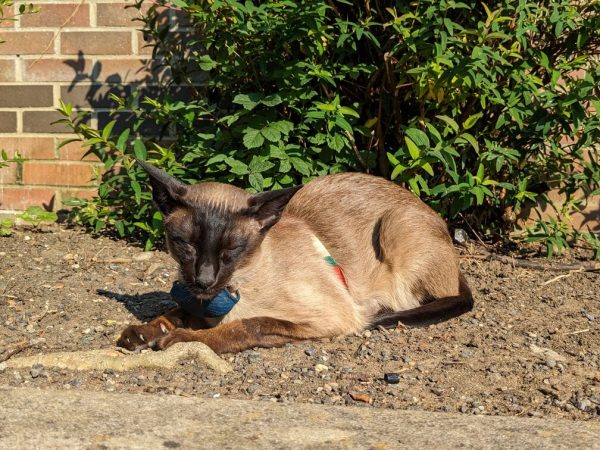Have you ever found yourself with a case of indigestion after eating, say, a foot of Christmas tinsel? Or how about being unable to resist a quick chew or two of that shiny sewing needle with two feet of thread? Yeah, me neither. But, many of us likely know someone who has. A furry someone. That ate something, or sometimes many things. The holidays are a time to be merry, after all?
When Problems Arise, Money Talks
Pica (the eating of inappropriate objects) is just one behavior exhibited by furry troublemakers. Cats get into all sorts of mischief!
Cat fight abscesses are so popular in vet clinics that they have garnered their own initialism: CFA. In fact, vets have these initialisms and acronyms for all sorts of unpleasant situations pets get into: Hit By Car (HBC), Hyperthyroidism (HT4), and Chronic Kidney Disease (CKD) just to name a few.
In Alaska, we had a fairly unique initialism for the sled dogs that found themselves on the wrong end of a moose: KBM (Kicked By Moose).
But what do these experiences, or rather illnesses, have in common? In short, they are all rather pricey to diagnose and treat, and unfortunately all too common when it comes to our feline friends. (Well, maybe not KBM…)
Understanding Pet Insurance

Pet insurance market penetration varies hugely by country. In the US, current estimates are that less than half of pets have insurance coverage, though when broken down by species, it’s estimated that fewer than 25% of pet cats have pet insurance.
Arguments certainly exist against pet insurance. Concerns include the ethical implications of potentially guiding treatment based on insurance status, as well as the increased cost of care associated with diagnostics that can be afforded with insurance. Others voice similar issues seen in the human healthcare industry, which may be attributed to insurance.
But in reality, veterinary care is no different than human medical care. We have complicated procedures like CT, MRI, and advanced surgical and professional training, all done in appropriate conditions with trained medical teams.
It takes money to run and maintain these skill sets and facilities.
Understanding Veterinary Medicine
Yet veterinary care is often underrated or appreciated compared to its bigger brother. While human healthcare workers strive for better pay or favorable working hours, veterinarians and vet nurses work similar hours and similarly unsociable schedules for far less.
And worse, veterinary professionals often are put into situations with no choice but to subsidize the cost of pet care out of their own pockets, by charging less or offering discounted services, when care is needed but funds are simply not available.
It’s no wonder that with burnout, a high rate of suicide, and a lack of incoming trained professional staff, the veterinary profession is becoming concerningly unbalanced. While insurance is not an answer for every issue faced by the profession, it may offer some small steps in the right direction. Certainly, when recommended treatment is not dictated by financial means, both owners, cats and the people providing their medical care should all see positive outcomes.
Case Study: Dougie

Going back to foreign bodies, I’d like to present Dougie: a lovely, impish, young dude of a cat. He loves long walks outside with his mom, and keeps things entertaining, finding various ways to get onto neighbors’ rooftops, or more recently attempting to stuff his own Christmas stocking with an entire plastic container of cat treats that he chewed multiple holes into, then sprinkled all over his stocking that he tore off a door. So, in short, he’s a Siamese that seems to have garnered a love of living life on the edge.
Dougie is 5. He’s had surgery to remove a foreign body, been diagnosed with inflammatory bowel disease through biopsies, had repeated bouts of laryngitis, and underwent a 3-month treatment for coronavirus (with weekly medications often costing hundreds of dollars). As his mom says lovingly, he might not be here if it wasn’t for insurance.
Starting to see the benefit of cat insurance?
Why Insurance Is A Necessity for Most Cats

Admittedly, Dougie is a bit of an extreme example. However, if nothing else, getting insurance that will cover for something like dental care, including extractions, is a strong consideration. Many pets will need multiple dental procedures in their life, as cavities and calculus lead to common dental issues.
Because these procedures require anesthetic to be safe for your pet and medically effective, and include a period of hospital stay for the day, x-rays the same as you or I would have, professional assessment of the dental health, IV fluids, bloodwork, and dental surgery time, these procedures can quickly become financially intensive.
Things To Consider When Researching Pet Insurance
- What is the policy excess?
- Is the policy an annual policy, or a lifetime policy?
- Are there any exclusions for coverage?
- What do you need to do annually to maintain coverage?
- What is the amount of coverage you need?
- Alternatives To Insurance
- Personal savings: Some people set aside a health savings account for their pet, annually or monthly
- Clinic wellness plans: Insurance doesn’t generally cover wellness care such as vaccines, or nail trims, or annual exams. Often, prescription foods aren’t covered, either. Some clinics offer various forms of wellness plans or subscriptions, which can offer significant savings on some of these other pet necessities. While not a true replacement for insurance, they are a similar topic for consideration
Dougie Approves
In the end, as a veterinarian, I can’t recommend a specific insurance company. But I can tell you that most of us who work in clinics, have our own pets insured. It helps on those days you can’t find your Apple Airpod, only to find that suddenly, your cat (or dog) makes a ringing noise when someone calls your mobile…
So pet insurance definitely gets Dougie’s stamp of approval. And if you are going to get it, don’t wait until after your cat is ill! Of course, there are additional barriers when it comes to cats: cats are great at hiding disease, and cats are viewed as more challenging to take into the vet clinic, and therefore have less visits. (Easy tips and fixes can help address both these topics! Maybe to be covered here in the future!)
But we need to start somewhere. And if Dougie approves, it’s hard to argue with him.
Featured Image Credit: visivastudio, Shutterstock






